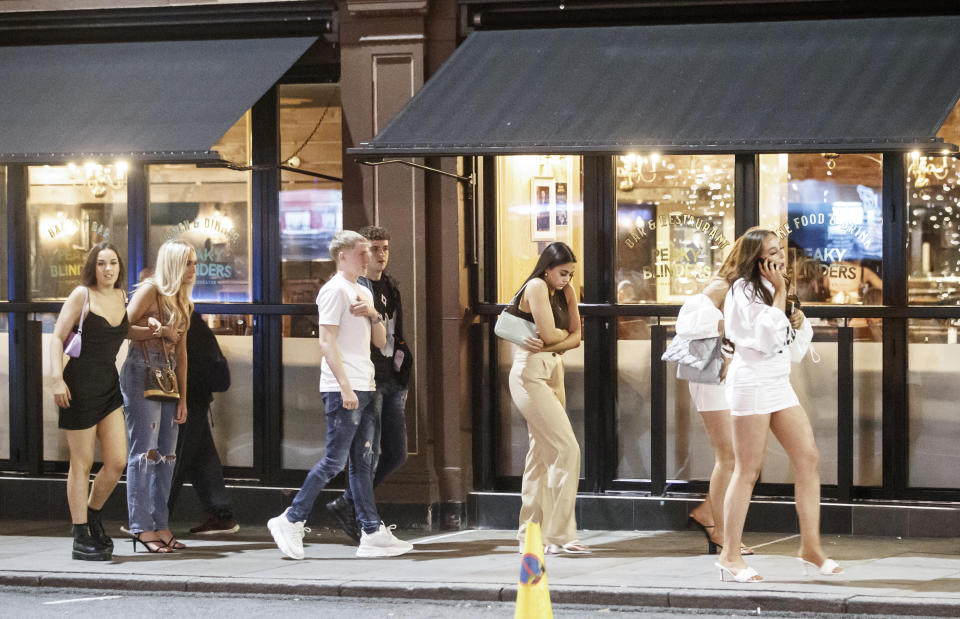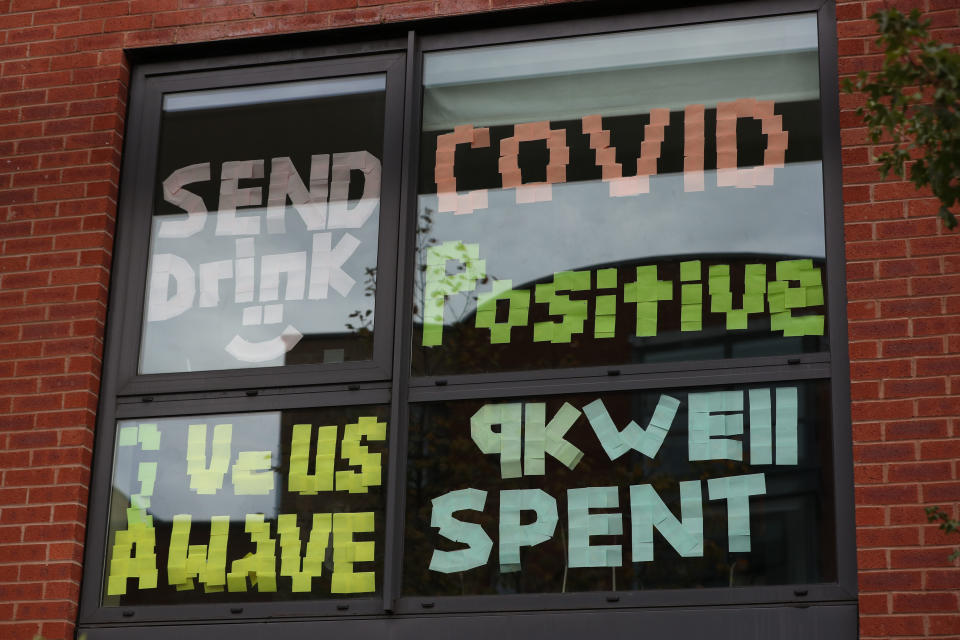Coronavirus soars in Manchester as city becomes UK's COVID hotspot

Manchester now has the highest coronavirus infection rate in the UK, with positive tests doubling in the space of just one week.
The city is now the UK’s COVID-19 hotspot as Public Health England data published on Monday afternoon shows that the weekly rate of new cases has now topped 500 cases per 100,000 people.
A total of 2,927 new cases were recorded in Manchester in the seven days to October 2 – the equivalent of 529.4 cases per 100,000, up from 246.4 in the previous week.
Manchester has the highest weekly rate of any local authority area in England. Knowsley has the second highest rate, which has jumped from 324.1 to 498.5, with 752 new cases, and Liverpool is in third place, up from 306.4 to 487.1, with 2,426 new cases.
On Monday, the UK recorded 12,594 new coronavirus cases and 19 deaths.
Watch: Boris Johnson unable to give figures after glitch
It comes after a technical glitch meant that almost 16,000 cases were missed by the government’s Test and Trace system, which led to a spike of 23,000 cases reported on Sunday.
Public Health England (PHE) said cases between 25 September and 2 October were mistakenly omitted, causing delays in finding contacts of those who tested positive for the virus, in some cases by a week.
Boris Johnson was unable to say how many contacts of positive coronavirus cases had been missed.
Read more: Where did the missing 16,000 positive coronavirus tests come from?
The glitch – reportedly caused by an Excel sheet which had reached its maximum file size – also means that local authorities do not know the true level of infections over the past 10 days.
Other areas recording big jumps in their seven-day rates include Newcastle upon Tyne (up from 268.1 to 434.9, with 1,317 new cases); Nottingham (up from 59.5 to 382.4, with 1,273 new cases); Leeds (up from 144.9 to 316.8, with 2,513 new cases); and Sheffield (up from 100.9 to 286.6, with 1,676 new cases).
Read more: Have your say: Are you happy with Boris Johnson's personal handling of coronavirus?
Much of the rise in the City of Manchester can be attributed to cases among students aged 17-21 – more than half (55%) of cases coming from this group, the Manchester Evening News reported.
The issue is said to be mainly affecting the city’s student suburbs, with most of those affected being asymptomatic and living in halls of residence, it added.
Manchester Withington MP Jeff Smith, whose constituency covers many of the affected areas, asked health secretary Matt Hancock in the Commons on Monday to rule out unfair local coronavirus restrictions as a result of figures that give a “misleading picture of the extent of the virus in the wider community”.
Hancock responded: “This is why I resist the temptation to set a simplistic threshold above which a certain level of action is taken. And that’s because there might be an incident – I mentioned there might be an incident in a workplace, for instance.
“There might be an incident within a halls of residence, where you might get a very high number of cases but if it’s confined and not within the wider community, you wouldn’t want to take action to restrict the social activity of the wider community.

“So that has to be taken into account, along with the data on the number of cases, on the positivity – because the number of tests that you put in effects that as well – and we take all these things into account, both in asking when an area needs to have more restrictions applied, and when we can take an area out of restrictions, which of course is so important for everybody living there.”
Test and Trace and Public Health England joint medical adviser Susan Hopkins also told Manchester Evening News that the glitch did not affect decision-making in local areas.
“Our analysis now shows that this issue affected a total of 15,841 cases from the period between 25 September and 2 October, with the majority occurring in recent days. This means the total number of positive cases over this period was higher than previously reported,” she said.
Read more: Boris Johnson insists COVID rules are easy to follow – as 64% say they aren't
“Of these, over 75% (11,968) relate to cases that should have been reported between 30 September and 2 October.
“This issue did not affect people receiving their COVID-19 test results and all people who tested positive have received their COVID-19 test result in the normal way. It also does not impact the basis on which decisions about local action were taken last week.”

On Sunday, mayor of Greater Manchester Andy Burnham warned that northern England faces a “winter of discontent” if the NHS Track and Trace system doesn’t improve.
He said that if there are to be local restrictions, “they must come with local control of test and trace, a local furlough scheme, and support for our councils and businesses”, according to the BBC.
“Put it under local control because the government are using call centres to try and contact people, but we will put boots on the ground and I am absolutely certain that that approach will be more successful.”
Coronavirus: what happened today
Click here to sign up to the latest news and information with our daily Catch-up newsletter
Watch: UK coronavirus cases rising - why are deaths still low?

 Yahoo Finance
Yahoo Finance 
